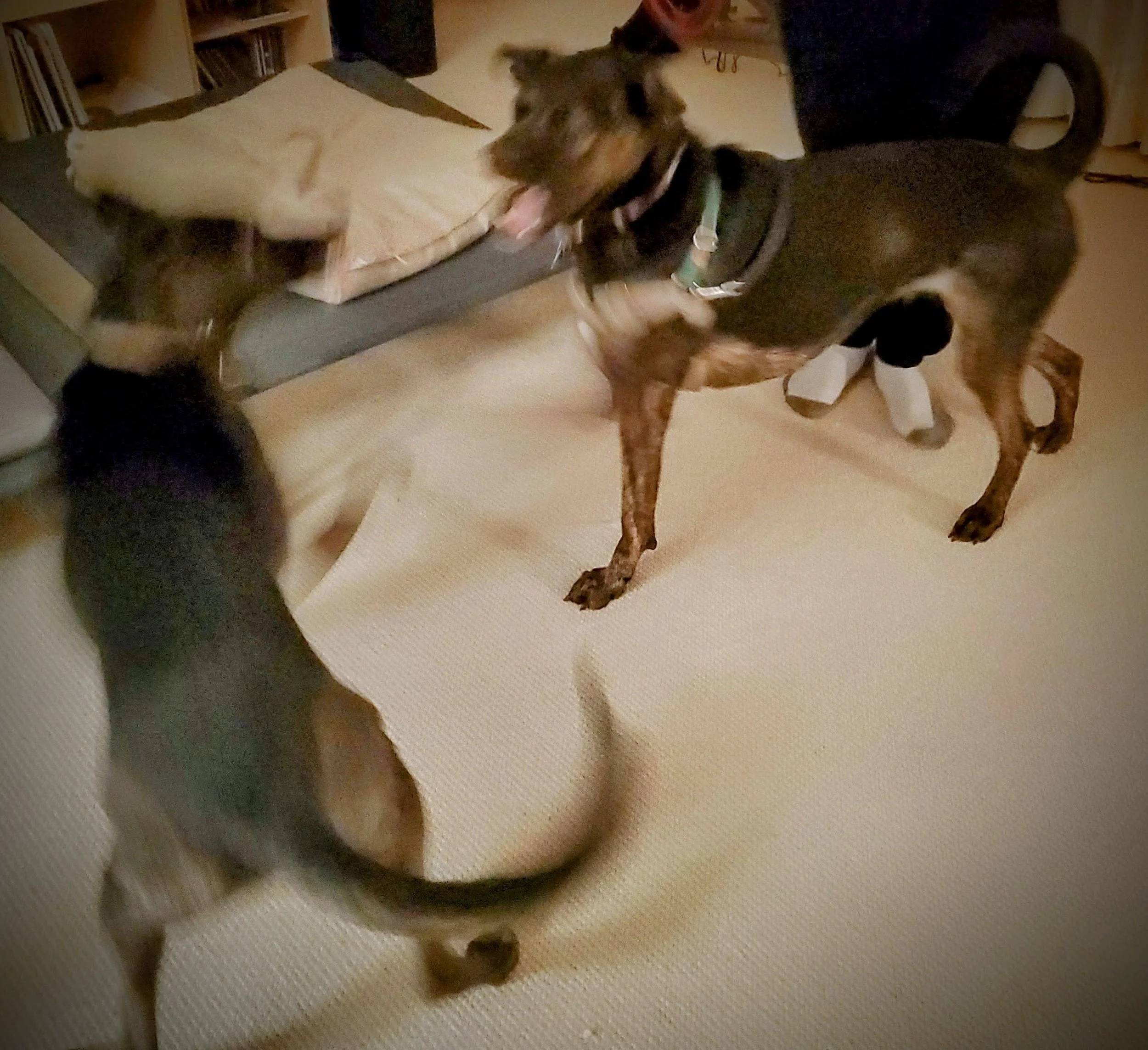Rehearsing The Best I Can
What’s zazen good for? Absolutely nothing! This “good for nothing” has got to sink into your flesh and bones until you’re truly practicing what’s good for nothing. Until then, your zazen is really good for nothing. — from To You by Sawaki Kodo Roshi
When my dogs are doing something I really don’t want them to do, my first priority is to remove them from the situation. For example, we go out on the front porch and they spot a neighborhood dog out for a walk. They start barking and their excitement level gets way over threshold. I don’t want them rehearsing that behavior (I got this phrase from Susan Garrett. I don’t know if she originated it).
Spotlight On The Grit
First, Knock It Off
A first principle in Alexander Technique is inhibition. When I first started taking AT lessons that word did not feel comfortable to me. It seemed negative, and I associated it with a lack of freedom and self-expression.
Anytime there’s a change to make (and there always is), the first step is inhibition.
Games You Can Win
Being calm is the biggest asset on the road to gaining some awareness of our opportunities to make choices. I like the word agitation for the state of body and mind we usually find ourselves in. It brings to mind the agitator in a washing machine that keeps things tumbling around, in motion, and mixed up. This isn’t a bad bit of imagery for the physical and mental state in which we are often stuck (and emotional. Is emotional separate from those two?). We agitate ourselves by worrying about the future, replaying the past, consuming food or media … it’s a long list. Here’s what I think is our biggest stumbling block though - we avoid being still.
Foundations
One of the main things we’re dealing with in Buddhist practice is behavior. One of my teacher‘s favorite formulas goes something like, “Ordinary beings live by their karma, bodhisattvas live by their vows.” This directly addresses the behavior we engage in (Do I do things informed by my karma or my vows?). I almost wrote ’choose to engage in’, but actually the fact that we’re rarely making choices about our activity is the point I want to get at today.
Advice from my teacher: Studying zen is too much work with too little fruit
Opening the Self
Opening the Hand of Thought is Uchiyama Roshi’s expression for our zazen practice. One of my ways of studying for the last few months has been listening to my teacher Shohaku Okumura’s commentary on this book. This study has stirred a lot of thoughts about the way I practice. Okumura Roshi started doing his commentary during his Sunday morning talks more than 10 years ago. Now there are probably more than 300 hours of commentary on the book! In the introduction to Opening the Hand of Thought Okumura Roshi writes, “We try to keep the same upright, immovable posture no matter what condition we are in, and to trust that above the clouds of thoughts, Buddha’s wisdom and compassion are shining like the sun in a clear blue sky. This is what opening the hand of thought has come to mean in my life.” My jumping off point for this talk is my realization that the word ‘thought’ in this expression is a translation of the Japanese word so, or xiang in Chinese (想). So or 想 is the third of the five skandhas.
A Fairy Tale
There was a boy born to the duke and duchess near the capitol of the kingdom. The duchess had for many years been under the influence of an evil spirit, and so was very fearful about and cruel to her new baby. She warned him, from the time he was born, “You must not show yourself.” The duke was a foolish and weak man, and was sure his powerful wife must be right so often repeated her warning to the child: “You must not show yourself.”
Come, Monk
Yesterday was a very auspicious occasion. We held a ceremony to ordain two new priests in our community at Clouds in Water. Genjo Sam Conway was ordained by Byakuren Ragir, and Shojin Be Alford was ordained by Sosan Flynn. This is not the kind of thing that happens very often - I was working on a talk about a completely different subject when it occurred to me that it might be a good idea to talk a little about ordination in our tradition, and something about the history and practices associated with it.
I’m going to explore a bit about the history of ordination and the precepts in our lineage and a little about the path of priest ordination in Soto Zen Buddhism in the 21st century U.S. I’d like to express something about why I decided to pursue ordination and what I think it means to be a zen priest.
The Buddha’s Teaching about Suffering and Dogen Zenji’s Shikantaza
I’ve been looking at a short section of a work called the Sutta Nipata. The Sutta Nipata is one of the very oldest collections of the Buddha’s teachings. It’s basically a collection of very short suttas, many of them are in a kind of question and answer format. The one I’m going to talk about today is from section 4 (The Chapter of the Eights) of the Sutta Nipata. #11: Kalahavivada Sutta (Disputes and Contention)
My teacher has drawn attention to this text many times over the years because of its very clear explanation about the way our day to day suffering develops, and also because of the resonance between the Buddha’s teaching about the end of that suffering and the teachings of Dogen Zenji and his own teacher Kosho Uchiyama Roshi.
WHAT DOES SITTING HAVE TO DO WITH BUDDHA’S TEACHING?
People develop a sitting meditation practice because they need or want something different in their lives. Maybe they want to be calmer, or to lower their blood pressure, or to sleep better or improve their performance at work or their relationship with their family. Maybe there are as many reasons as there are people. They want something to be different, to be better, in their lives. No one comes to do this because everything is perfect in their lives. I want to be clear before I go further that I think this is great. I hope it works. Anything one can do to make themselves genuinely healthier and happier is wonderful as far as I’m concerned.
But, if you show up at a Zen center like this one you pretty quickly start hearing about no attainment, practicing without gaining mind. For example, Sawaki Roshi said “What is zazen good for? Nothing! We should be made to hear this good-for-nothingness so often that we get calluses on our ears and practice good-for-nothing zazen without any expectation. Otherwise, our practice really is good for nothing.” In my understanding, zazen practice as a Buddhist activity is not what we all initially come here for.









